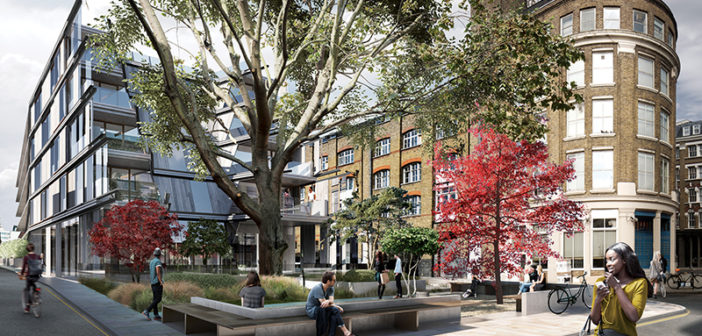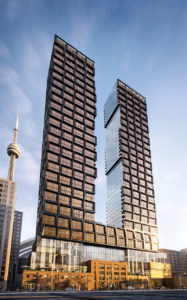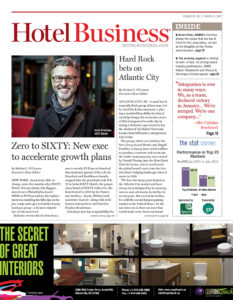MIAMI—Nobu Hotels’ recent expansion into Europe is just the beginning. Opening its doors in June 2017, Nobu Hotel Shoreditch, with its 143 guestrooms and seven suites, will be situated in the same city Japanese chef Nobu Matsuhisa opened his first European restaurant more than 20 years ago—London. While the luxury lifestyle brand is on the move globally, it’s also being selective. The pitfall of opening up properties just to plant flags isn’t the way Nobu does business—and it never will be.
“The locations really have to fit where the Nobu customer profile is going,” said Trevor Horwell, CEO of Nobu Hospitality Group. “We’re seeing that certain locations may not fit the brand, but at the same time, we want to grow the customer base. So places like Shoreditch are really about growing the customer base of Nobu because Shoreditch will not be a copy of Malibu; it will fit the psychographics of the area, more or less.”
Also slated to open in Europe at around the same time as Nobu Hotel Shoreditch, is Nobu Hotel Ibiza Bay, situated in Ibiza, Spain, located on the shores of Talamanca Bay. In addition to its 152 rooms and suites, it will have three restaurants and a pool bar. The hospitality company expects to have three opened properties in Europe by the end of 2017. Nobu has been looking at additional locations, such as Paris and Rome.
“Normally what happens is when you open your first hotel, then you get the exposure and people are interested, and then it starts to grow from there,” Horwell noted.
In March, Nobu Hospitality, Madison Group and Westdale Properties announced plans for Nobu Toronto, the first-ever integrated Nobu residences, hotel and restaurant. This will be Canada’s first Nobu hotel and Nobu restaurant. The residences will have 700 condominium suites in two 49-story towers.
In the U.S., Nobu is looking at locations such as Boston, Atlanta and Washington, DC. “Those locations, we believe, are strong locations for the restaurant and the brand, and we have a lot of customers coming from those locations as well,” Horwell said.
First, the ideal location for one of the brand’s hotels needs to be in an area where one of Nobu’s restaurants will also work. “That is very key,” he explained. It’s what Nobu’s customer base expects from the hospitality group, which has more than 35 restaurant locations worldwide—including cities such as New York, Beijing, Tokyo and Dubai. The second factor Nobu considers when assessing potential real estate for a hotel is the strength of the market in a particular location.
The two considerations work hand in hand. For Nobu, the hotel and restaurant have to work. “Our business model is we have a strong customer base that drives local business into the restaurant as well as the customers coming to the hotel, so at the same time it’s holistic for the whole property, and that really generates a very strong business model for investors,” said Horwell, who noted Nobu is a very high-margin business. “In all of our hotels, the restaurant is really a key component of what we’re doing.” Each location is different, and that’s what’s driving Nobu’s success in F&B, according to the CEO.
“The most important thing for us is that the restaurant has to have a personality,” he said, adding that “people don’t want to go to hotel restaurants. It has to be a place for locals. For us, it has to be really like a standalone restaurant that people want to go to.”
As far as hotels, Nobu sees its sweet spot as properties with 100 to 200 rooms, with restaurants around the 10,000-sq.-ft. mark. “We think what makes a hotel special is, naturally, the style, but at the same time, size is important,” Horwell said, articulating the brand’s approach to wrapping its hotels around its restaurants. “We tend to do smaller properties because you can get more personality out of smaller hotels. We don’t like to be chain-like, and we’re also very focused on highly personalized service. For us, the type of hotel we’re operating has to be not your big-box-type of hotels.” If the brand decides to take on larger projects, its efforts will be on delivering the same level of service it normally provides for hotels and restaurants of smaller sizes.
Another instrumental aspect to Nobu’s value proposition is its room service. This is especially true for the brand’s property in Las Vegas, which has the Nobu Villa—a 10,300-sq.-ft. villa—on top of the hotel. In addition to offering the three-bedroom villa as a place to stay ($35,000 per night), Nobu also hosts private parties and other events in the suite. “People go to Nobu because they can get a great stay as well as great F&B,” Horwell said, acknowledging that the culture and service of the brand is what its investors believe in.
Certain locations don’t work for the brand because it doesn’t believe it genuinely can provide the “Nobu level of service,” which is delivered with the utmost passion, a trait Matsuhisa, the chef and restaurateur, has had since the beginning of his career, Horwell suggested. “Nobu does everything from the heart,” he said. “He’s constantly on the road. He spends time in the kitchen. That’s real passion, and that’s what really motivates the employees.”
Nobu’s culture isn’t corporate, even with its global reach; it’s more family-like, he added.
Comparing Nobu to tech giant Apple, Horwell suggested the hospitality company’s guests come from all walks of life. “We’re no different to Apple in that we appeal to all age groups,” he said. Guests are changing, however—becoming more demanding. “The guest is becoming very fickle,” he said, admitting that loyalty is becoming increasingly difficult. “Sometimes it’s tough because people want to experience different things, but, hopefully, they’ll continue to stay with Nobu,” he added.
The hotel brand has kept a lot to itself over the years, but it’s now been gearing up to inform its customers more about what it’s been up to and how they can take advantage of it. “Because we’ve been in our infancy, in hotels, we’ve been careful not to flood the market with a lot of information, but as the hotels open, we’re starting to drip feed the market with regard to Nobu Hotels,” Horwell said, adding that the brand has been amping up its efforts on social media. “We have a huge database, so we try to work that database and let our customers know when we’re opening hotels, and so forth—that is a very key part to what we’re doing.
“Nobu isn’t about a reservation system. Nobu is about a great offering,” he added.
Nobu is now averaging three to four hotels a year. “We’re growing very systematically and methodically,” he said. “It isn’t about planting 15 flags in one year. Most importantly, we want to have the right partners. At the end of the day, if you don’t have the right partners you’ll have sleepless nights, and you don’t need that.” HB



